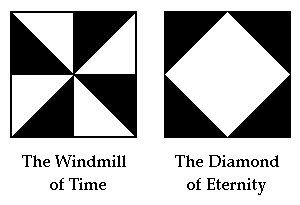ART WARS:
The following flashback to March 2002 seems a suitable entry for May, which is Mental Health Month.
Zen and Language Games
by Steven H. Cullinane
on March First, 2002
Two Experts Speak —
A Jew on Language Games
From On Certainty, by Ludwig Wittgenstein (Oxford, Basil Blackwell, 1969):
#508: What can I rely on?
#509: I really want to say that a language game is only possible if one trusts something. (I did not say “can trust something”).
— Quoted by Hilary Putnam in Renewing Philosophy, Chapter 8 (Harvard University Press, 1992)
An Arab on Deconstruction
From “Deconstructing Postmodernism,” by Ziauddin Sardar, at the website “The Free Arab Voice”:
Doubt, the perpetual and perennial condition of postmodernism, is best described by the motto of the cult television series The X-files: ‘Trust no One’….
Deconstruction – the methodology of discursive analysis – is the norm of postmodernism. Everything has to be deconstructed. But once deconstruction has reached its natural conclusion, we are left with a grand void: there is nothing, but nothing, that can remotely provide us with meaning, with a sense of direction, with a scale to distinguish good from evil.
Those who, having reviewed a thousand years of lies by Jews, Arabs, and Christians, are sick of language games, and who are also offended by the recent skillful deconstruction of the World Trade Center, may find some religious solace in the philosophy of Zen.
Though truth may be very hard to find in the pages of most books, the page numbers are generally reliable. This leads to the following Zen meditations.
From a review of the film “The Terminator”:
Some like to see Sarah as a sort of Mother of God, and her son as the saviour in a holy context. John Connor, J.C. , but these initials are also those of the director, so make up your own mind.
— http://www.geocities.com/
hackettweb2/terminator.html
From a journal note on religion, science, and the meaning of life written in 1998 on the day after Sinatra died and the Pennsylvania lottery number came up “256”:
“What is 256 about?”
— S. H. Cullinane
From Michael Crichton’s Rising Sun (Ballantine paperback, 1993) —
John Connor (aka J. C.) offers the following metaphysical comment on the page number that appears above his words (256):
“It seems to be.”
“Is your investigation finished?”
“For all practical purposes, yes,” Connor said.
Connor is correct. The number 256 does indeed seem to be, and indeed it seemed to be again only yesterday evening, when the Pennsylvania lottery again made a metaphysical statement.
Our Zen meditation on the trustworthiness of page numbers concludes with another passage from Rising Sun, this time on page 373:
Connor sighed.
“The clock isn’t moving.”
Here J. C. offers another trenchant comment on his current page number.
The metaphysical significance of 373, “the eternal in the temporal,” is also discussed in the Buddhist classic A Flag for Sunrise, by Robert Stone (Knopf hardcover, 1981)… on, of course, page 373.




















